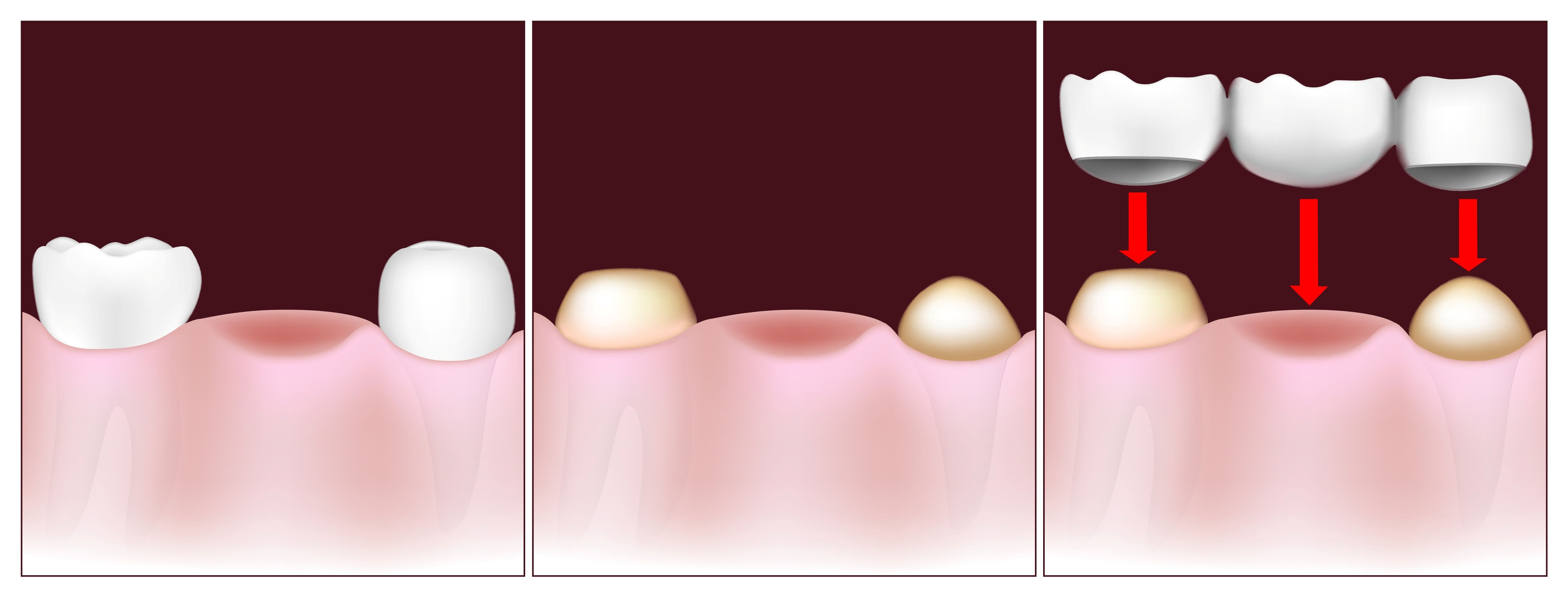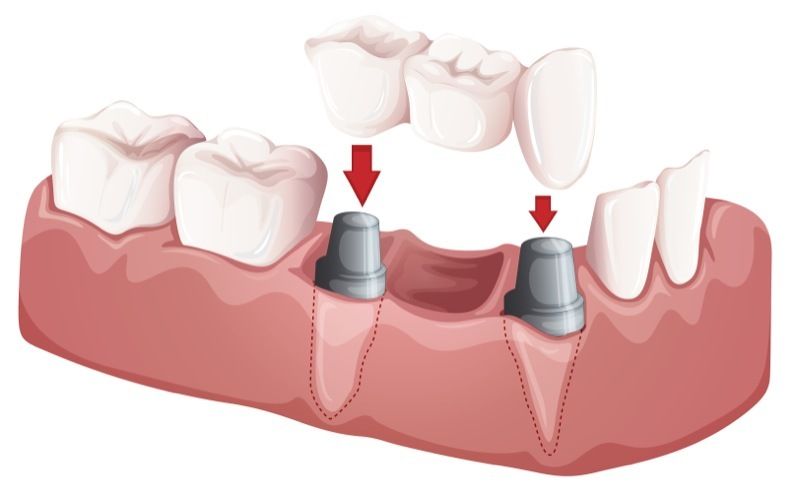
Dental Bridges
Even a single missing tooth can seriously impact your oral function, health, appearance, and self-confidence.
At Advanced Dentistry of Blakeney, we provide both traditional and implant-supported dental bridges to fill the gaps in your smile.
Wondering what a dental bridge can do for you?

A Bridge Can Improve Your Appearance and Quality of Life
Restore Oral Function
A dental bridge will fill gaps in your smile and reestablish your ability to bite and chew. You will be able to eat a more complete diet, and few foods will be off limits, especially if you choose a highly durable implant-supported restoration.
Create a Beautiful Smile
By filling in gaps, a bridge will keep your other teeth from shifting out of position. Dr. John M. Pinnix and Dr. George A. Betancourt can create a bridge which blends seamlessly with your natural teeth.
Benefit from Dental Implants
If you select an implant-supported restoration, the implant posts will prevent jawbone recession and additional tooth loss. In addition, your doctor will not need to alter your healthy teeth to support your bridge.
Take a closer look at how an implant-supported bridge works...
Feeling self-conscious about missing teeth?
Tooth Loss Is a Common Issue for Adults
Is a Traditional Dental Bridge the Right Type of Restoration for You?
Dental bridges are typically appropriate if you are missing between one and three teeth. If you have lost more teeth, a removable or fixed denture is typically a better option. To be a candidate for a bridge, your remaining teeth must be healthy enough to support the restoration. If they are severely weakened or decayed, your dentist may need to remove them and provide a larger restoration such as a full denture.
Implant-Supported Bridges versus Traditional Bridges
 Implant-supported bridges are very similar to traditional bridges. However, instead of being supported by dental crowns placed over adjacent teeth, implant-supported bridges attach to small titanium posts embedded in the jaw. The number of posts placed will depend on the size of the bridge.
Implant-supported bridges are very similar to traditional bridges. However, instead of being supported by dental crowns placed over adjacent teeth, implant-supported bridges attach to small titanium posts embedded in the jaw. The number of posts placed will depend on the size of the bridge.
If you are considering an implant-supported bridge, your jawbone must be strong enough for treatment. Our dentists will use x-rays and other imaging to examine your jaw and determine whether implants are a good option for you. Dental implants are placed in the jawbone, where they integrate with surrounding tissues. If your jawbone has started to recede, it may not be stable enough for this treatment. If this is the case, Dr. Pinnix can perform a bone graft or sinus lift, which will restore lost tissue and enable you to receive implants.
A dental bridge can improve your appearance, oral function, and overall quality of life. The restoration will fill in gaps in your smile and reestablish your ability to bite and chew.
Though they require a greater investment of time and money, an implant-supported bridge offers many advantages over traditional restoration options. With traditional bridges, the teeth surrounding the gap in your smile must be altered for crown placement. Since implant-supported restorations do not rely on teeth for support, they require no removal of healthy tissue. They are also extremely stable, and you can depend on them to stay in place while you eat, speak, and smile.
In addition, implants are the only method of tooth replacement that protects your jawbone against atrophy. An implant-supported restoration replaces your entire tooth from root to crown. By replacing tooth roots, the implant signals your body to send resources to that area of the jaw. Without tooth roots, the body will begin to distribute the bone tissue of the jaw elsewhere. With proper care, your implant posts can last a lifetime and facilitate long-term oral health.
Budgeting for an Implant Bridge
Most insurance plans contribute to the cost of a bridge, but few contribute to the cost of dental implants. We want to make this option accessible to all patients. We accept CareCredit® and Citi® Health Card financing help make this incredibly beneficial treatment a fit for most budgets through affordable monthly payments.
Explore Your Candidacy
To qualify for dental implants, you must be in good oral health and have sufficient tissue in your jawbone to support the implants. For certain patients, compromised implant candidacy can be restored by undergoing a preparatory procedure such as a bone graft or sinus lift.
For patients missing two or more consecutive teeth, an implant-supported bridge can provide a comfortable, natural-looking solution with many important benefits.
If you have an oral health condition such as gum disease or tooth decay, we must resolve these issues before placing implants. Smokers must be willing to cease the habit for a period before and after implant surgery. Ideally, they should break the habit for good. Uncontrolled diabetes can also preclude patients from receiving implants. We can help create a strategy that allows implants to become a beneficial component of your smile.
If you have certain conditions which prevent you from receiving an implant bridge, our doctors can provide a conventional bridge to restore the form and function of your smile.
What Happens when You Receive a Bridge?
When you receive a traditional bridge, Dr. Pinnix or Dr. Betancourt will reshape the teeth on either side of the gap in your smile. Some patients might choose to undergo sedation prior to this step, while other are comfortable with a local anesthetic. Your doctor will then take impressions, either manually or with our CAD/CAM scanner. Your practitioner will use these highly precise measurements to design your bridge. Bridges can be made from several different materials. For the most realistic appearance, we usually recommend porcelain or zirconia. However, in some cases, a metal or porcelain-fused-to-metal restoration may be appropriate. Once your new, custom-made bridge is ready, Dr. Pinnix or Dr. Betancourt will attach it to your teeth.

If you choose an implant-supported bridge, Dr. Pinnix or Dr. Betancourt will place two or more implant posts into your jawbone. Over the next several months, your bone and the implants will fuse. Once your jaw has fully healed, your dentist can attach a custom-crafted bridge.





